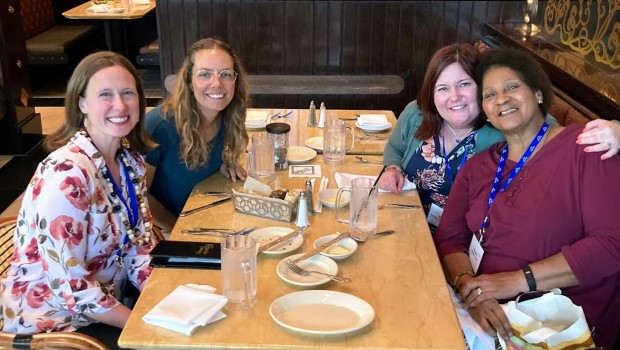ACT Center is excited to share findings and build connections

AcademyHealth’s Annual Research Meeting is coming to Seattle and we’re presenting…posters, presentations, and panels, oh my!
Our mission at the Center for Accelerating Care Transformation (ACT Center) is to build connections that bring researchers and care delivery systems together, and we’re doing just that at the 2023 AcademyHealth Annual Research Meeting (ARM) in Seattle, June 24-27! AcademyHealth is a prominent national organization that convenes health services researchers, policymakers, health care practitioners and, stakeholders to improve health and health care.
Our team members are excited to share findings and ideas related to health care workforce burnout, the future of learning health systems, the efforts to integrate social health into primary care, and much more. If you’re attending ARM, we invite you to join us to learn more about the ACT Center’s work to improve health for people and communities everywhere by streamlining the path from research to practice.
ACT Center presentations at ARM
Paula Lozano, co-director of the ACT Center, will lead a special panel session called "Next Generation of Learning Health Systems." During this session, the panel will discuss how learning health systems will shape the future. Paula and the panel will answer questions that matter to individuals and organizations of different sizes, with the goal of building a strong base for better quality, fairer, safer, and more effective health care in both health systems and communities. This session is on Sunday, June 25 at 11 a.m.
Jess Mogk, ACT Center collaborative scientist, will present, “Using Virtual Practice Facilitation to Implement a Multilevel Intervention to Reduce High Dose Opioid Prescriptions: Feasibility, Challenges, and Engagement Strategies” as a part of a session titled, “Understanding Context and Experience in Implementing Evidence-Based Addiction Care.” Jess’ presentation will focus on the feasibility of using virtual practice facilitation, based on recent experience using it as the primary implementation strategy in Kaiser Permanente Washington’s Integrated Pain Management Program. Jess will also share lessons learned and strategies used to overcome challenges with engaging primary care teams virtually. This session is on Monday, June 26 at 10 a.m.
ACT Center posters at ARM
- ACT Center collaborative scientist Kelsey Stefanik-Guizlo’s “Patient Engagement to Co-Design and Implement an Intervention to Reduce High-Dose Opioid Prescribing in a Large Integrated Delivery System”
- Kelsey’s poster describes how patients with persistent pain were actively involved in improving their care using a multidimensional and iterative patient engagement process. The findings highlight how meaningful patient engagement can lead to more useful processes and resources for care teams and patients and support better health outcomes. Come see the poster on Sunday, June 25 from 3:30-4:45 p.m.
- Stefanik-Guizlo’s “Delta Center Evaluation Results: Strengthening the Safety Net through Policy and Practice Change”
- The Delta Center for a Thriving Safety Net is an innovative initiative that brings state primary care and behavioral health associations together to foster collaboration and advance policy and practice change. The ACT Center is a key partner in this work – we’re now at the halfway point and ready to share a sneak peek into what's been going well and what challenges still need to be tackled. Come see the poster on Sunday, June 25 from 3:30-4:45 p.m.
- ACT Center collaborative science manager Claire Allen’s “Measuring Burnout and Job Satisfaction across Care Team Roles throughout a Crisis to Identify Strategies to Improve Well-Being”
- Wellness for the health care workforce is more important than ever. The ACT Center and the KPWHRI Survey Research Program administered a survey on burnout and job satisfaction to care team members in 30 primary care clinics at 3 different timepoints. Results show that Medical Assistants are the most burned out, and we need to focus on developing wellness interventions for all care team members to maintain high-quality care for patients. This work underscores the importance of routinely gathering data on engagement, wellbeing, burnout, and team functioning across all roles. With these findings, we can focus on interventions to improve the wellbeing of the workforce. Come see the poster on Monday, June 26 from 2:45-4 p.m.
- ACT Center partner Ammarah Mahmud’s “Effects of a Social Health Integration Program on Patient-Reported Social Needs"
- Ammarah is sharing exciting initial findings from a pilot social health integration program at Kaiser Permanente Washington. After co-designing and implementing an approach to conducting universal social health screening in two primary care clinics, the team randomly assigned members who indicated at least one social health need to receive social health support either through the local Community Resource Specialist (CRS) or Connections Call Center, a national call center, to explore the effectiveness of two different social needs targeted care approaches. The poster describes how patients' social needs changed over an 8-week period and is a glimpse into the impact of different care approaches on addressing social health needs. Come see the poster on Monday, June 26 from 2:45-4 p.m.

